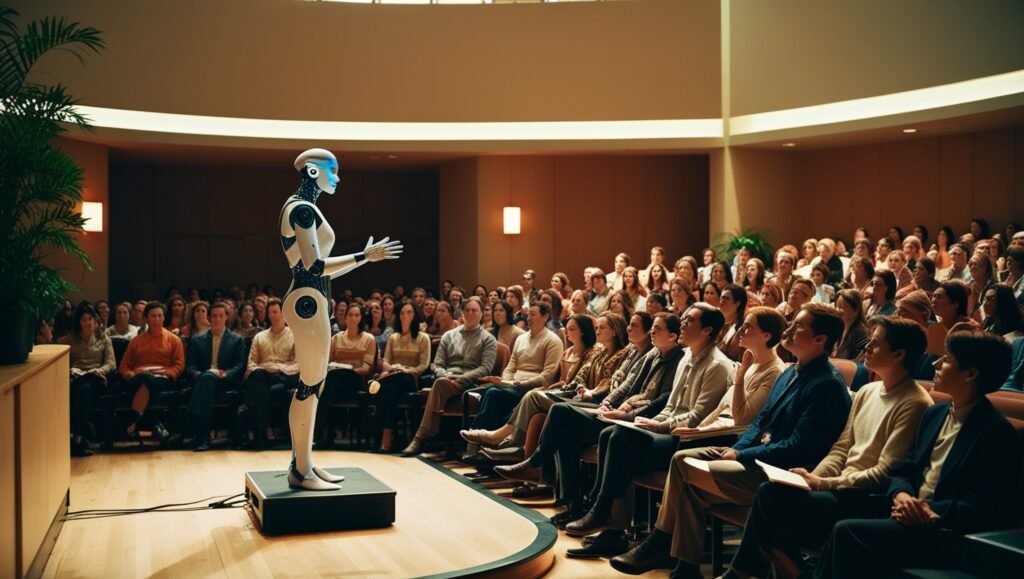Mira Murati, CTO of OpenAI, shares insights on the evolution of AI, its applications, and the future of generative AI technologies. She emphasizes the importance of safety, ethical considerations, and AI’s transformative potential across various industries.
1. Introduction
• Welcome and introduction of Mira Murati by Alexis Abramson
• Mention of special guest Joy Buolamwini and other attendees
2. Mira Murati’s Journey
• Overview of her career path from Dartmouth to Tesla and OpenAI
• Key experiences and transitions in her career
3. AI Basics and Innovations
• Explanation of machine learning, deep learning, and generative AI
• Development and capabilities of models like ChatGPT and Dall-E
4. Safety and Ethical Considerations
• Importance of building safety measures alongside AI development
• Mira’s views on regulatory frameworks and collaborative safety efforts
5. Impact on Various Industries
• AI’s transformative potential in different sectors
• Specific examples of AI applications and innovations
6. Future of AI
• Predictions on the evolution of AI intelligence and capabilities
• Discussion on job displacement and new opportunities
7. Role of Higher Education
• How institutions like Dartmouth can contribute to AI advancements
• Mira’s advice to students and future AI professionals
8. Q&A Session Highlights
• Key questions from the audience and Mira’s responses
• Topics covered include creative rights, biometric rights, and personal advice
9. Conclusion
• Closing remarks and appreciation by Alexis Abramson
• Final thoughts on the importance of AI and Mira’s contributionsIntroduction
On a bright afternoon at Dartmouth’s new building, Alexis Abramson, Dean of Thayer School of Engineering, welcomed a packed room for a special event. The occasion was a conversation with Mira Murati, a class of 2012 Dartmouth alum and the Chief Technology Officer at OpenAI. The event also honored Joy Buolamwini for her work in AI ethics and algorithmic justice and celebrated her upcoming honorary degree from Dartmouth.
Mira Murati’s Journey
Mira Murati began her professional journey at Dartmouth, where she was involved in designing hybrid race cars with the Formula Racing Team. After graduating, she briefly worked in aerospace before joining Tesla to work on innovative projects like the Model S and Model X. Her interest in self-driving cars and AI led her to join a startup focused on spatial computing before she finally landed at OpenAI, drawn by its mission to build safe, artificial general intelligence.
AI Basics and Innovations
Mira explained the fundamentals of AI, machine learning, and deep learning, emphasizing that these technologies build on decades of human endeavor. She highlighted how combining neural networks with vast amounts of data and compute power has led to transformative models like ChatGPT and Dall-E. Thanks to advancements in deep learning and scaling laws, these models can perform a wide range of tasks, from language understanding to generating images and code.
Safety and Ethical Considerations
According to Mira, safety and ethics are paramount in AI development. She stressed that building safety measures alongside AI capabilities is crucial. Mira advocated for a collaborative approach involving policymakers, civil society, and industry to create effective regulatory frameworks. She explained that smarter AI systems are easier to control and direct, making the development of safety protocols an integral part of the research process.
Impact on Various Industries
AI is set to revolutionize numerous industries, from finance and healthcare to media and entertainment. Mira shared examples of current applications, such as AI-driven customer service chatbots and content creation and analysis tools. She emphasized that AI’s potential extends to every sector, with significant opportunities for improving productivity and innovation.
Future of AI
Looking ahead, Mira predicted that AI systems would achieve human-level intelligence in specific tasks within the next few years. She acknowledged concerns about job displacement but highlighted the potential for AI to create new opportunities and transform existing roles. Mira called for rigorous study and preparation to understand and mitigate the impact of AI on the workforce.
Role of Higher Education
Higher education institutions like Dartmouth have a vital role in advancing AI. Mira envisioned a future where AI tools enhance learning and creativity, making high-quality education accessible to everyone. She encouraged students to embrace a broad range of subjects and maintain a sense of curiosity and joy in their studies.
Q&A Session Highlights
During the Q&A session, audience members asked insightful questions about creative rights, biometric rights, and AI’s societal impact. Mira discussed the importance of consent and compensation for creative contributions and shared OpenAI’s approach to handling biometric data responsibly. She also offered personal advice to students, encouraging them to focus on learning with less stress and more curiosity.
Conclusion
The event concluded with closing remarks from Alexis Abramson, who thanked Mira Murati for her valuable insights and contributions to AI. The conversation provided a deeper understanding of AI’s current state and future potential, highlighting the importance of safety, ethics, and collaboration in advancing this transformative technology. The audience left with a sense of inspiration and a renewed appreciation for the role of AI in shaping our future.
For more
Watch the 51-minute Dartmouth Engineering Alumni conversation.



